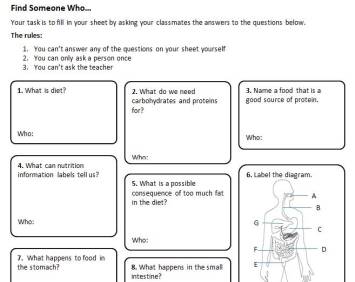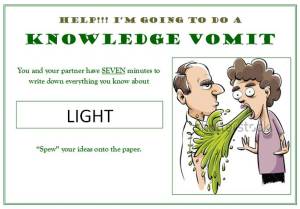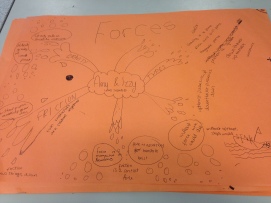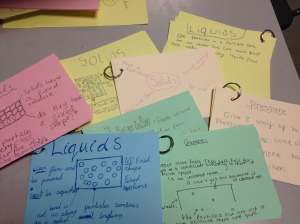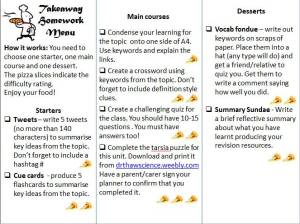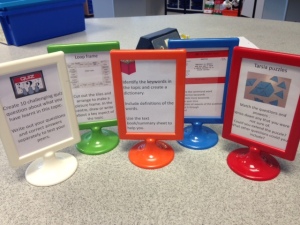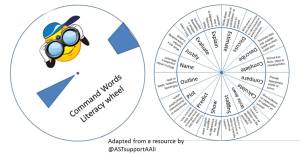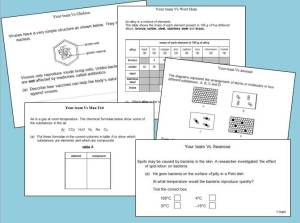Too often I have been told by KS4 students that they don’t know how to revise, I decided that this was something that needed to be addressed much earlier. I’m not saying that I haven’t revised with KS3 classes before – I have, but this year I wanted to discuss revision with students from year 7 and get them thinking about strategies that work for them and that they can use in other subject too, not just mine.
This year I have reflected on the activities that I have used with my classes and have spent time talking with students about how to revise effectively and what they have found helpful. I have used a range of activities in class and as homework. Below are some thoughts about things I have used in my lessons.
Find someone who.
I first found one of these activities on TES resources and I use these often. I find that at the start of the year they are very good for helping students to communicate with other members of the class, perhaps those that they wouldn’t normally speak to. Our school has a huge number of feeder schools and often students are the only one from their primary school, this is a good way to encourage them to talk to others. I have found, that for me, this activity works as students are talking about the topic and explaining their ideas, they also suggest people in the class that have given good answers to particular questions. It takes some of the pressure of students if they are unsure of answers as they don’t need to answer questions themselves.
One problem that I have encountered with this activity is some students who just give their sheet to other people and tell them to answer questions – so not listening to answers and writing them down themselves. I have had to make sure that expectations are explained clearly at the start.
Knowledge vomit.
I saw this activity on twitter – I can’t remember who shared it though – any ideas?
Sometimes I have used this before doing other activities – such as ‘find someone who’ so that pupils have a chance to share knowledge before undertaking a task. If they get stuck when they are completing work later on they have something that they can refer back to. Students have responded well to this activity. Again, it is an opportunity for students to communicate with each other and discuss the topic that we have been working on. They usually start with recall of keywords and then start to expand them by adding definitions and diagrams. Some groups add links between keywords and explain how they have decided on that link.
Flashcard keyrings.
I used this with both of my Year 7 classes this year. I made the keyrings (I purchased the split rings from amazon) and then I asked them to make revision cards for different parts of a topic. The first time that I divided the topic into small chunks and asked them to create a card for each one. The example shows some examples from work on the particle model. I had asked students to create separate cards for solids, liquids and gases. Some students drew diagrams* that they annotated, others wrote about properties and some created questions/answers. Students said that they found the activity helpful and one suggested that we could do make a card at the end of a lesson that they could add so that they were building up notes as they went along.
*I did discuss the diagram of the spaced out particles in a liquid with the student who had drawn it.
Takeaway homework.
I have used #takeawayhmk several times and have used a revision version with KS4 before. The idea of using this at KS3 was to get pupils to try out a range of different activities and decide for themselves which ones they found useful. Many students opted to write a reflective summary as their dessert option and it was interesting to read their responses about the tasks that they had chosen to complete – especially those that said that they had found something difficult but they were glad that they had stuck with it. Several students had opted for the vocab fondue which included asking a friend or relative to write a comment about how they had done. There were lots of positive comments from parents about how their children had worked on the tasks and how they had enjoyed finding out about what they were learning. I have set this a couple of times with various classes but even when it isn’t set, students are using some of the activities to help them revise.
There is always a chance that students will not choose a task that is challenging enough but this is not something that I have noticed so far with my classes. With students who struggle with making choices I usually start by suggesting activities that I think they should try.
Revision stations in class.
The layout of my room is well suited to this kind of activity. I usually have a range of tasks laid out on different octagons, these include tarsia puzzles, loop frames, reversewords, quizzes, wordwall, posters and making a dictionary of keywords. Students work their way around the stations (they don’t complete them all). I specify a certain amount of work that I expect them to complete so that they don’t spend too long doing one thing.
Exam technique.
Previously this was something that I only really did with KS4 students but is now something that I have discussed with my other classes too – especially after seeing that marks that they were losing in tests are not down to lack of knowledge, but are often down to not doing what the question asked (describe/explain) or not including enough information for all of the marks available.
The literacy wheel was adapted from a resource shared by @ASTsupportAAli here. I modified it to have the command words from our KS4 specification. I spent some time with my Y8 class recently talking about exam questions and identifying command words and what they mean. At the end of the lesson several students said that they had found this helpful and in their most recent assessment I did notice a difference with some students who have previously struggled with this. It was also pleasing to see that a couple of students had highlighted parts of the question to help them check that they had answered everything when they checked through their work. In future I will expand this to include some of the other tasks that I use at KS4, such as annotating questions without answering them.
Football Revision.
This is adapted from something that I found on TES resources a few years ago – I don’t know who the original creator was as I can’t find the resource anymore.
Students answer exam questions – these ones are all taken from past SATs papers. Each questions ‘belongs’ to a particular football team. When they have answered the question they collect the mark scheme and mark it. Every mark they get is a goal to them, every one they lose is a goal to the opposition. Different teams were used to indicate the difficulty of the question, so Manchester City was harder than Leicester City.
I was suprised at how much my classes enjoyed this – they got very competitive! As they worked through I checked that they had understood why they had lost marks and what they could do next time. Of all the activities that we have done in class, this one is the one that they have asked if they could do again and have said that they found the most useful.
Personally, it was great to see students working so well together and discussing why they had/hadn’t got the marks for a particular question – I wasn’t quite so keen on how pleased they were when they told me that they had just thrashed Spurs 6-0 though.

